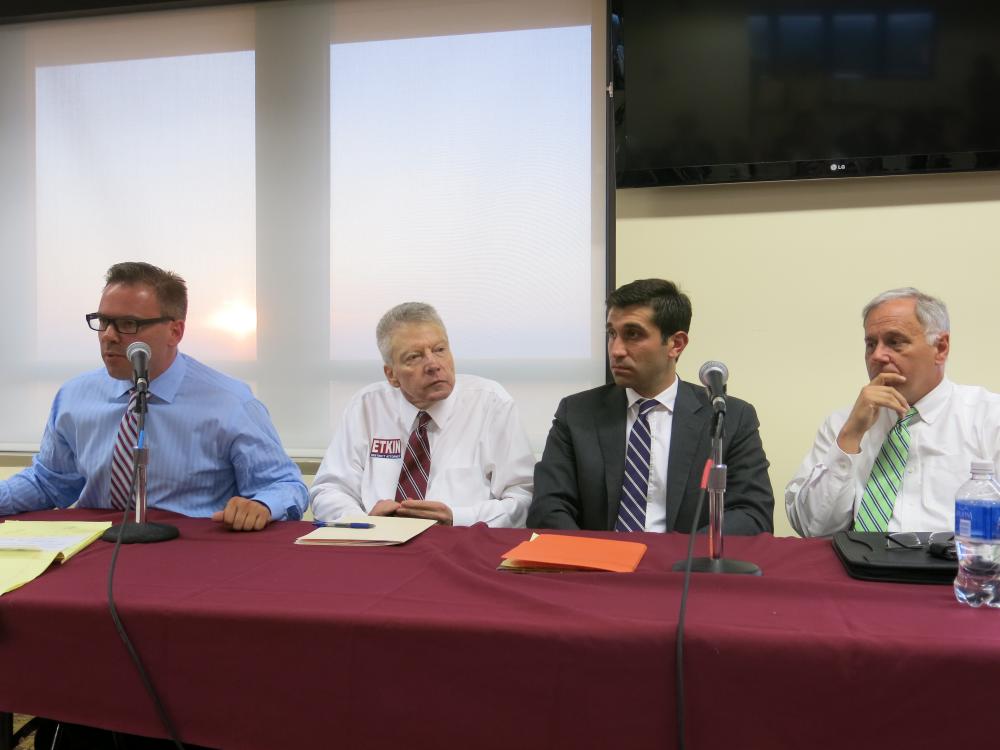Among the most important western Massachusetts races in next Tuesday’s primary is the contest for district attorney in Hampden County. With no incumbent running, it appears to be a wide open race among the four Democrats on the ballot. All of them are white men. That’s in a county where about a third of all residents identify as non-white.
The Hampden DA candidates can be hard to distinguish. Beyond their race, gender, and party affiliation, Shawn Allyn, Hal Etkin, Anthony Gulluni, and Brett Vottero, agree on many issues. When asked how they would work with communities of color, they stress they will build communication and trust.
Anthony Gulluni says he would put together a team to regularly meet with the public.
“It would be something that we would publicize, and say, ‘on such and such date, we’re going to be in a school gym, the district attorney, the assistant district attorney, and victim witness advocates to talk with young people, to talk with people from all communities,” says Gulluni.
Brett Vottero notes the office needs to address disparities in sentencing between white and minority criminals. He says that’s led to distrust of the judicial system.
“We can’t solve the crime problem until the entire community starts working together, and for that to happen, we have to address these fundamental issues of trust, and the huge disparities we have right now in the criminal justice system are not going to do anything to restore that trust,” says Vottero.
The other two candidates have promised community meetings, and eliminating the so-called “school to prison pipeline” among minority youth.
Those are broad goals, and for some black and Latino activists in Springfield, they’ve heard them before.

“I think oftentimes, DA’s run with the mentality that they will be visible in the community, and typically that’s not the case,” Justin Hurst, a Springfield City Councilor elected last year. Hurst, who is black, says past DA’s have not been visible or active enough.
“You have to build a level of trust with our community, or else you won’t get very far,” says Hurst, “especially when you’re looking for people to come out and actually serve as a witness in a particular case. It’s just difficult if you haven’t built the foundation from the start.”
Hurst says he’s met with each of the DA candidates, along with his wife, who’s a school committee member, and his parents who run a local African-American newspaper. He says they all chose not to endorse anyone.
“I think for all of us there was no candidate that really jumped off the page. I don’t know if that’s a good thing,” says Hurst. “I’m hopeful that the citizens clearly will identify somebody. My hope is that they identify the strongest candidate, because we really weren’t sure which one that was.”

Zaida Govan isn’t sure who the best candidate is either. She’s Puerto Rican, and a community organizer in Springfield. We met up at a donut shop in the city. She told me she wants the district attorney to communicate with people of color, and actively combat racism. I asked her if she thinks any of the four candidates could do that.
“To be honest with you, not really. I think there are some that might have the potential,” says Govan.
Part of the potential Govan sees for the new DA: finding new ways to address widespread drug addiction and mental illness.
“I think the district attorney is in a very good position to get those people away from prison, and maybe get them on target to recovery, to treatment, to help them become productive citizens of this society, and focus on the dealers,” says Govan.
That’s a sentiment echoed by Victor Davila. He’s the owner of a medical transportation company in Springfield, and a Puerto Rican activist. He says he wants to see a DA who can strike a balance.

“A crime is a crime no matter how you slice it, but we think justice, mercy is also important,” says Davila. “Mercy and compassion is part of a good, strong justice system.”
For Davila, showing compassion includes reform of prison sentencing practices, particularly for drug offenders.
“You look at the jails, and the jails are filled with first-time drug offenses,” says Davila. “In essence we’re wholesaling these people, and we as a society are kind of putting them aside.”
For drug offenders, prison sentences are determined by mandatory minimum laws – a required amount of prison time based on the type of drug offense. According to the advocacy group Families Against Mandatory Minimums, all candidates for Hampden DA support repealing those requirements, to varying degrees. That would give more discretion to judges. But the DA can only lobby for the changes. Any reform will have to come from the state legislature.
With no Republicans or Independents running, this election will be decided in Tuesday’s primary. But the candidates have had a big hurdle: getting voters’ attention. Justin Hurst says for many Springfield voters of color, the DA’s race might get lost in the crowded primary ballot.
“People are more concerned about the governor’s race than they are about their district attorney’s race, and I don’t know if we as leaders have done a great job in terms of really stressing to the Springfield community, who will be most impacted by the future DA, exactly how critical this race is,” says Hurst.
The primary is September 9th, leaving the winner a few months to prepare for many challenges when he takes office in January.
